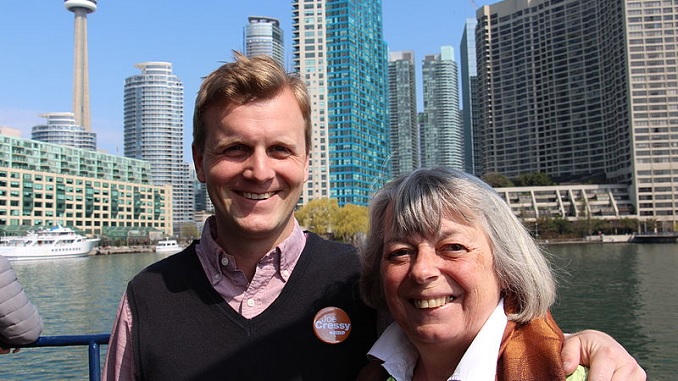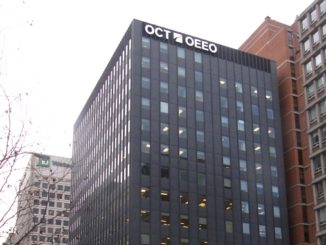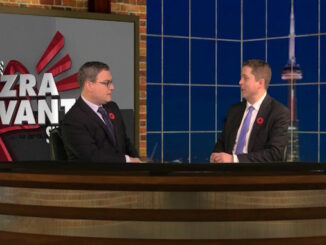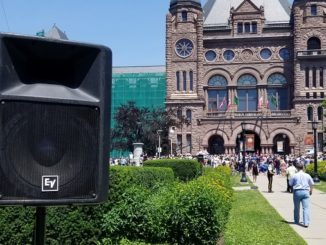Torontonians are all too familiar with the ongoing housing crisis in our city. Every time we have to look for a new apartment, or watch our landlords hike up our rent again, we experience the crisis for ourselves. And actually buying a house? Pure fantasy for most of us.
The average market rent in this city is, according to a statement from City Hall, $1,132 for a one bedroom apartment. For someone working full time at minimum wage, that works out to more than half your income just to stay indoors. But what about affordable housing? Here’s a few numbers from the city to give you a quick snapshot:
- 94,000 – Number of social housing units in Toronto
- 6,433 – Number of affordable rental homes
- 10,000 – Toronto’s goal for building affordable homes between 2010 and 2019
- 4,321 – Actual number of affordable homes expected to be built between 2010 and 2019 (yes, that’s less than half)
- 181,071 – Current waiting list for Toronto’s centralized social housing waiting list
- 10 – number of years people may be forced to wait for affordable housing
It’s easy to get the feeling that City Council would rather debate settled and kind of stupid things over and over instead of actually solving problems, but there are some great Councillors in this city who keep their eye not only on our problems but also on potential solutions. When it comes to housing, nobody has been more vocal or determined than Councillor Joe Cressy of Ward 20.
I sat down with the Councillor to talk about his recent, successfully passed motion calling on TCHC to stop the practice of closing down affordable housing units, and his plans for helping address this ongoing human rights crisis right here at home. Comments have been edited slightly for clarity.

Your motion, which passed earlier this week, calls on TCHC to stop the practice of closing down affordable housing units. What motivated you to submit your motion?
I sit on board of TCHC as well as council and it strikes me that in a city as wealthy as ours, a city that also has a huge waiting list for affordable housing, the need is huge. We should be debating how many new units of housing to build, not how many to close. So my motion was to ensure that we turn the corner in our city and stop closing units and in fact get back in the business of building new ones.
Everyone trying to make a living in Toronto is painfully aware of the rapid rise in housing costs. What do you think are the primary drivers of these price increases?
As the only member of city council who doesn’t own property, I understand the housing crunch on personal level. I think the drivers are the fact that we have limited supply and unlimited demand. The other piece, and this is where the city can do more, is that housing affordability isn’t just related to ownership. It also has to do with affordable rents. So on that basis we need more purpose-built rental units.
Last year, Council passed the “Open Door” affordable housing strategy. What do you think are the best parts of the strategy? What do you think needs improvement?
The strategy makes sense by looking at leveraging city owned land to kick start it. That’s something we need to do more of, leveraging our own city asserts for the purpose of building more affordable housing.
There are a number of incentives built into it based on park levies and others, and those are good, but if the city is truly committed to more affordable housing, yes we need incentives to support private development but the city should also get back in the business of building affordable housing.
Obviously, the rubber hits the road at budget time. Council has been notoriously reticent to consider appropriate revenue tools over recent years and we are facing a constant budget crunch despite ongoing economic growth. How do you think we can break that bottleneck when it comes to funding housing solutions?
It takes political will. Ultimately, I think we need politicians who are willing to raise taxes and invest funds in the services and housing we need. And we need residents in the city to rise up and demand better.
If you had a magic wand and could instantly implement any one policy to address the housing crisis, what would it be?
It would be to put in place inclusionary zoning. That’s a practice whereby a percentage of units in a new building are required to be there for affordable housing. It’s a policy that requires provincial legislative change. That to me, if we really want affordable housing, we’d mandate equitable housing, which mandates 10 to 20 percent of units be affordable.
What can the average Torontonian do to help make a solution a reality?
Demand better from their councillors and MPPs.
***********************************************************************************************
So long as basic shelter is treated as a commodity instead of a human right, we will all bear responsibility for ensuring that the housing market responds to the needs of the entire spectrum of Toronto’s citizens. This city must live up that responsibility with real affordable housing policy – including spending the time and money to build that housing directly. You can find your Councillor’s office and website, with contact form, at this link. Ask them to invest in affordable housing and to advocate for inclusionary zoning. Tell them the Guardian sent you.




